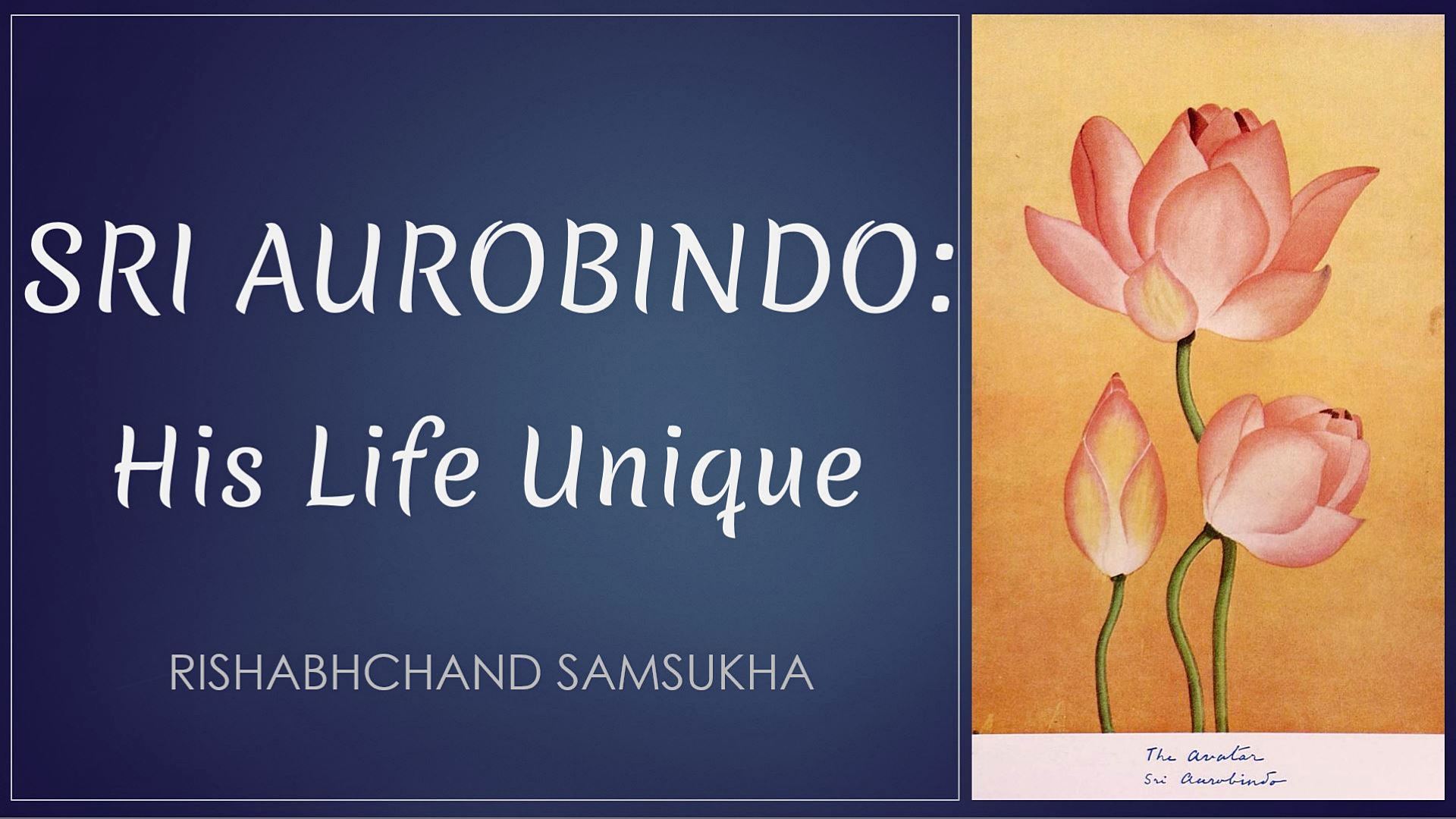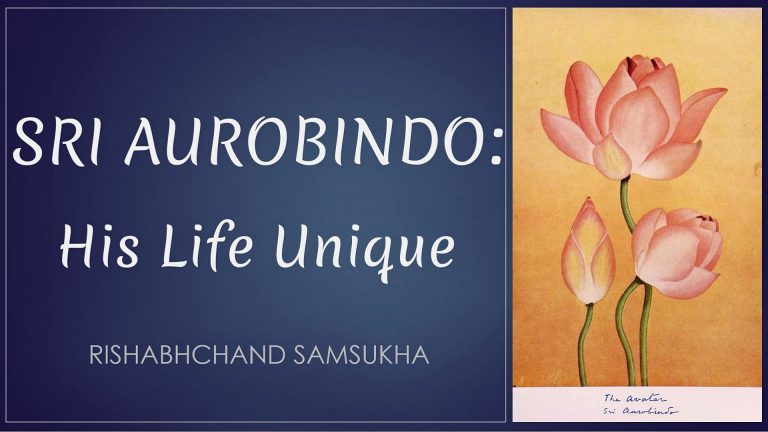Rishabhchand, the author of this book, has to his credit a number of other books, all of them shot through and through with the Light and Presence of Sri Aurobindo and the Mother. They stand out impressively against the background of innate humility and graceful flow of his style and language.
At the Feet of The Mother
Sri Aurobindo: His Life Unique

A unique biography of Sri Aurobindo, which was written by Rishabhchand Samsukha in response to a request from The Mother, reviewed chapter by chapter by Nolini da, and translated by Andre Morisset for its bilingual publication at the Bulletin over the period of 10 years starting in 1960.
Sri Aurobindo was the third son of his father. Aurobindo means lotus. It was an uncommon name in those days, and that was why his father chose it for his third son, little suspecting that, in occult language, aurobindo signifies the Divine Consciousness.
When Sri Aurobindo was eleven years old, he had a sort of premonition that great revolutions were going to take place in the future and that he had a part to play in some of them. Not a mental idea, but a kind of inner feeling was growing within him that he had some great work to do, a mission to fulfil.
When he had left India, he was a mere child of seven, perhaps unaware of the heavenly fire smouldering beneath his sweet, angelic exterior. And when he returned, he was a young man of twenty-one, burning to realise his dreams and visions.
The goal which Sri Aurobindo held up before himself at that early age when he wrote these letters to his wife, was not escape, not Nirvana, but God; not extinction of life, but its expansion and enrichment, its divine illumination, utilisation and fulfilment.
... three master passions dominated three principal stages of Sri Aurobindo’s life. The cult of spiritual patriotism dominated the first stage; the will to total self-offering to God, the second; and divine realisation and manifestation, the third. Essentially they formed an organic unity, all contributing to the accomplishment of his life’s work.
A brief outline of India in the middle of the eighteenth and the beginning of the nineteenth century will give the reader (and particularly the Western reader) the right perspective in which to view the origin, nature and growth of Indian nationalism and Sri Aurobindo’s contribution to it.
His first contribution to Indian politics was [...] a passion for complete and unqualified independence, which he infused into the Indian nation. And the sole driving force [...] was the religion of patriotism, the worship of India as the Mother [...]. This was his second contribution.
... people have formed and expressed misleading and often fantastic ideas of [Sri Aurobindo's politics]. Some have taken him to be a pacifist; others have dubbed him the arch-leader of the terrorist movement in Bengal.... The best thing for us would be to hear from himself what his politics really was.
The question which has occurred .... even to many of Sri Aurobindo’s close and trusted colleagues — is this: Why did Sri Aurobindo engage in insurrectionary and revolutionary politics? He was one of the foremost leaders of the Nationalist or Extremist party....
His spirituality, which germinated in England and developed in India, was an ascent of his soul ... a fully conscious, exploratory, and heuristic ascent from level to level of experience, and from world to world of beings and forces, to the highest peaks of the transcendent Spirit.
His mind was made up. Bengal, he felt, had need of him. It was to be the field of his political work. His path lay clear before him — the path of the adoration of the Mother through suffering and sacrifice.
As many Indians, let alone foreigners, are not fully aware of the causes of the Partition of Bengal and the national forces that sprang up in reaction to it, we propose to pause upon it for a while before proceeding to take up the narrative of Sri Aurobindo’s political activities in the post-Partition period of the history of Bengal and India.
We have based our study of the political life of this “brightest star on the Indian firmament” on the fact, borne out by the unbroken tenor of his whole life and the essential unity of his vision, thought and action, that his politics was the politics of a Yogi, and not that of a mere politician.
“Once more in the land of the saints and sages will burn up the fire of the ancient Yoga....” Here we have at once a prescience and a prophecy of the colossal work ... The integral Yoga was to transform human nature into Divine Nature and human life into Divine Life.
It is an historical fact to which we can no longer turn a blind eye that among the most passionate lovers and devoted servants of Mother India in the modern times, there have been only two who were Yogis, possessing the Yogic vision and intuition — Swami Vivekananda and Sri Aurobindo.
We have proposed to ourselves a brief and rapid estimate of the aims, ideals and achievements of the three of the greatest political leaders of contemporary India, who worked with Sri Aurobindo — Lal-Bal-Pal, Lala Lajpat Rai, Bal Gangadhar Tilak and Bepin Chandra Pal.
The greatest revolutions are hatched in silence by an inscrutable working of the Time-Spirit. The work of the prophet is more powerful, more creative than his words. And it is this intangible spirit with its irresistible force that moulds the destinies of mankind.

